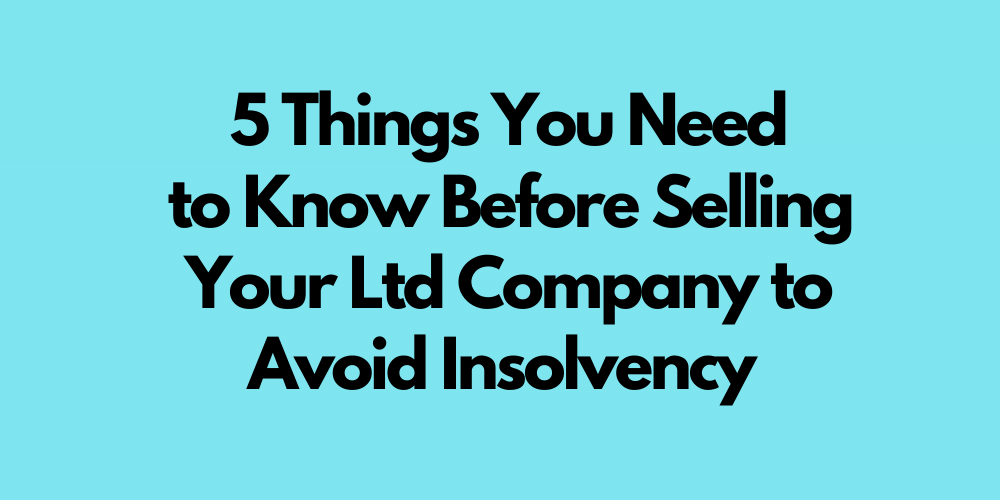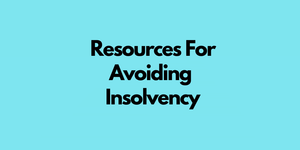5 Things You Need to Know Before Selling Your UK Ltd company to avoid insolvency.

Introduction: What is insolvency? And how is it possible to sell my UK Limited Company as an alternative to bankruptcy?
Trading whilst insolvent is a criminal offence in the United Kingdom. The offence applies to companies and individuals. A company is trading whilst insolvent if it continues to trade when it cannot pay its debts as they fall due. An individual is trading whilst insolvent if he continues to trade when he cannot pay his debts as they fall due, or when he has reasonable grounds for believing that he will be unable to pay his debts as they fall due.
What are the reasons to sell a limited company to avoid insolvency?
The main reasons to sell a limited company to avoid insolvency are as follows:
- 1. To ensure that all stakeholders (e.g. employees, creditors, directors) receive the maximum value for their shares or interests in the company;
- 2. To prevent the company from becoming subject to an administration order or company liquidation and
- 3. To enable the company to continue its business operations as a going concern.
Things I need to know before I sell my company to avoid insolvency
When you're a small business owner, there may come a time when you feel like you can't go on. You're tired, the small businesses is draining you financially and emotionally, and you just don't see a way out. This is the perfect time to consider sell my company to avoid insolvency. But before you do, there are some things you need to know to avoid insolvency or using an insolvency service.
1. Don't sell to the first person who offers you money. Take your time and shop around for the best offer.
2. Make sure that the new owner has a solid plan for taking your company forward. If they don't, it could be worse than if you'd continued running it yourself.
3. Get everything in writing before signing any papers. This includes the terms of the sale, the payment schedule, and what will happen to your employees.
4. Don't agree to any new contracts or changes in the way you run your business until you've sold it. 5. Consider acting as a caretaker and continue running your company while it's being sold.
5. Maintain your independence as much as you can. You may not be able to, but try to do so if possible.
6. If you've sold your company and you want to keep it running, consider forming a new company with the proceeds from the sale.
What are the risks of selling a limited company versus calling in an Insolvency Practitioner?
When a business is no longer making a profit and it is struggling to pay its bills, the owner has three options: sell the company, call in an Insolvency Practitioner, or keep the company going.
The first option, selling small businesses, is often seen as the best option because it allows the owner to walk away with some money instead of losing everything. The second option, calling in an Insolvency Practitioner, means that the limited company will be liquidated and the company directors will receive nothing. The third option, keeping the company going, means that the owner or company directors risk losing everything if the company fails.
Therefore, when faced with a business that is not making money, the decision of whether to sell or call in an Insolvency Practitioner and opt for a company liquidation depends on how much money the owner stands to lose if the soon to be insolvent company fails.
What are the benefits of selling a limited company versus calling in an Insolvency Practitioner?
When a company is struggling financially, the owner has a few options. They can either sell the company as a whole, or they can call in an Insolvency Practitioner to help them through the process. There are benefits and drawbacks to both of these options, which are outlined already in this article.
One of the benefits of selling a limited company is that the owner can usually receive more money for it than if they called in an Insolvency Practitioner. This is because when a company is sold, it is sold as a whole, whereas an Insolvency Practitioner will typically break the insolvent company up and sell it off in parts.
Another benefit of selling a limited company is that the process is usually much quicker than calling in an Insolvency Practitioner.
Is it expensive to call in Insolvency Practitioners to wind up a UK limited company?
When a UK limited company is no longer able to pay its debts, it may be forced into liquidation. This process can be very expensive, as the company must hire an insolvency practitioner (IP) to wind up the business. The cost of an IP's services will depend on a number of factors, including the size and complexity of the soon to be insolvent company's affairs.
However, it is generally safe to say that calling in an IP will be costly for the business owner and likely run into tens of thousands of pounds in costs.
Conclusion: The benefits of selling a limited company versus calling in an Insolvency Practitioner
When small businesses are in trouble, the owners have to make a decision: Should they sell the company outright, or should they call in an Insolvency Practitioner? There are pros and cons to both options, but in most cases, selling the soon to be insolvent company is the better choice.
The benefits of selling a limited company are many. First, the owner can get a fair price for the company, since there are always buyers who are interested in purchasing a business. Second, the owner can avoid all of the hassles and headaches of going through bankruptcy proceedings. Third, by selling the soon to be insolvent company, the owner can avoid any legal action or alternative dispute resolution that might be taken by creditors.
Alternatives to Insolvency when Trading Whilst Insolvent
It's a legitimate move to sell your company to avoid insolvency. Found how you can sell your UK company today, and walk away from liabilities for a tiny fraction of the cost of UK Insolvency fees.
Directors who violate Company Directors Disqualification Act 1986 may be suspended from office for up to 15 years, they can be fined, and may face the loss of their property and personal assets, including their home.
Simple & Low Cost Alternative to Liquidation
However, there is a simple and low cost alternative to insolvency for your UK limited company.
You can legitimately sell your business to a third party, along with all the business' debts and liabilities. It's fast, easy and very low cost when compared to liquidation, bankruptcy and insolvency.




